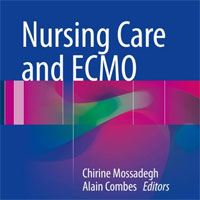
Study Shows How Bacteria Spread from Sink Drainpipes to Patients
Many recent reports have found multidrug resistant bacteria living in hospital sink drainpipes, putting them in close proximity to vulnerable patients. But how the bacteria find their way out of the drains, and into patients... read more

Reducing Catheter-associated Urinary Tract Infections in the ICU
Patients in the ICU are at higher risk for catheter-associated urinary tract infection (CAUTI) due to more frequent use of catheters and lower threshold for obtaining urine cultures. This review provides a summary of CAUTI... read more

ICU May Be Overused for Some COPD, Acute MI, HF Patients
For patients with COPD, heart failure and myocardial infarction, who are not critically ill, a stay in the ICU may be no more beneficial than staying on a ward, according to an analysis just published in the Annals of the... read more

Medicating patients during extracorporeal membrane oxygenation
Extracorporeal membrane oxygenation (ECMO), which can support gas exchange or hemodynamics in patients with severe respiratory or cardiac failure, has demonstrated considerable evolution over the last decade [1], with a steady... read more

The effects of performance status one week before hospital admission on the outcomes of critically ill patients
PS impairment was associated with worse outcomes independently of other markers of chronic health status, particularly for patients in the medium range of severity of illness. PS impairment was moderate in 17.3 % and severe... read more

Hypertriglyceridemic pancreatitis: Can we defuse the bomb?
Hypertriglyceridemia causes ~9% of pancreatitis, the third most common cause after alcohol and gallstones. It is a risk factor for severe pancreatitis, making it more frequent among ICU patients with pancreatitis. I see... read more

Ultrasound-guided Pleural Effusion Drainage With a Small Catheter Using the Single-step Trocar or Modified Seldinger Technique
Ultrasound-guided pleural effusion drainage by catheter insertion is a safe and effective procedure. The success rate is low when the effusion is loculated and septated. Both the trocar and the modified Seldinger techniques... read more

One of the Deadliest Hospital-Acquired Infections Is Preventable
Johns Hopkins Study Shows One of the Deadliest Hospital-Acquired Infections Is Preventable. For some hospital patients, going on a ventilator is often the difference between life and death. About 800,000 hospital patients... read more

Hemodynamic Support after Cardiac Surgery
Low cardiac output syndrome is a common complication of cardiac surgery and is associated with increased mortality. Levosimendan has been shown in small studies to be an effective therapy.... read more

Teen Who Walked While On Life Support is Home from Hospital
For the past 467 days, Zei Uwadia has been hospitalized on life support -- but that hasn't kept the quiet-natured teenager from walking, eating her favorite foods or even doing planks as exercise. Now, with determination... read more

Antifungal Treatment in the ICU
Invasive fungal infections (IFIs) are a major cause of morbidity and mortality in critically ill patients. Almost 80% of IFIs are due to Candida spp., which are the third most common isolated microorganisms in the intensive... read more

Probiotic and Synbiotic Therapy in Critical Illness
Critical illness is characterized by a loss of commensal flora and an overgrowth of potentially pathogenic bacteria, leading to a high susceptibility to nosocomial infections. Probiotics are living non-pathogenic microorganisms,... read more

Critical Care Pharmacotherapeutics
Critical Care Pharmacotherapeutics presents information on the fundamentals of critical care practice from a pharmacist's point of view. This accessible text is an excellent introduction to critical care pharmacy. Pharmacy... read more

Enough is Enough (O2 Saturation of 94-96%)
The liberal use of supplemental oxygen therapy in acutely ill adults has a long history in the hospital, but high-quality therapy supporting its practice is unclear. Recently, the role of oxygen therapy in non-hypoxic patients... read more








